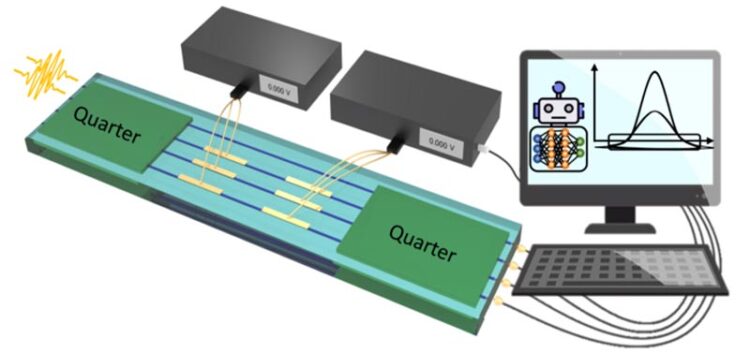Deep learning for quantum sensing

Machine learning for adaptive multiphase estimation with an integrated photonic quantum sensor.
Credit: Cimini et al., doi 10.1117/1.AP.5.1.016005.
Artificial intelligence assists quantum metrology for greater efficiency with an innovative model-free learning algorithm.
Quantum sensing represents one of the most promising applications of quantum technologies, with the aim of using quantum resources to improve measurement sensitivity. In particular, sensing of optical phases is one of the most investigated problems, considered key to developing mass-produced technological devices.
Optimal usage of quantum sensors requires regular characterization and calibration. In general, such calibration is an extremely complex and resource-intensive task — especially when considering systems for estimating multiple parameters, due to the sheer volume of required measurements as well as the computational time needed to analyze those measurements. Machine-learning algorithms present a powerful tool to address that complexity. The discovery of suitable protocols for algorithm usage is vital for the development of sensors for precise quantum-enhanced measurements.
A particular type of machine-learning algorithm known as “reinforcement learning” (RL) relies on an intelligent agent guided by rewards: depending on the rewards it receives it learns to perform the right actions to achieve the desired optimization. The first experimental realizations using RL algorithms for the optimization of quantum problems have been reported only very recently. Most of them still rely on prior knowledge of the model describing the system. What is desirable is instead a completely model-free approach, which is possible when the agent’s reward does not depend on the explicit system model.
As reported in Advanced Photonics, a team of researchers from the Physics Department of Sapienza University of Rome and the Institute for Photonics and Nanotechnologies (IFN-CRN) recently developed a model-free approach that widens the range of possible applications to that of adaptive multiphase estimation. They demonstrated the effectiveness of their model-free approach in a highly reconfigurable integrated photonic platform. They experimentally employ the RL algorithm to optimize estimation of multiple parameters and combine it with a deep neural network that updates after each measurement the Bayesian posterior probability distribution.
The protocol handles the quantum multiparameter sensor in a completely black-box manner, since at any step the system functioning model is not required. Importantly, they proved the enhanced performance obtained with their protocol on experimental data in a resource-limited regime and compared it to that of nonadaptive strategies, achieving significantly better estimations.
According to corresponding author Fabio Sciarrino, head of the Quantum Lab, “The protocol developed by our team provides a significant step toward fully artificial-intelligence-based quantum sensors.”
Read the Gold Open Access article by Cimini et al., “Deep reinforcement learning for quantum multiparameter estimation,” Adv. Photon. 5(1), 016005 (2023), doi 10.1117/1.AP.5.1.016005.
Journal: Advanced Photonics
DOI: 10.1117/1.AP.5.1.016005
Article Title: Deep reinforcement learning for quantum multiparameter estimation
Article Publication Date: 6-Feb-2023
Media Contact
Daneet Steffens
SPIE–International Society for Optics and Photonics
daneets@spie.org
Office: 360-685-5478
Original Source
All latest news from the category: Physics and Astronomy
This area deals with the fundamental laws and building blocks of nature and how they interact, the properties and the behavior of matter, and research into space and time and their structures.
innovations-report provides in-depth reports and articles on subjects such as astrophysics, laser technologies, nuclear, quantum, particle and solid-state physics, nanotechnologies, planetary research and findings (Mars, Venus) and developments related to the Hubble Telescope.
Newest articles

First-of-its-kind study uses remote sensing to monitor plastic debris in rivers and lakes
Remote sensing creates a cost-effective solution to monitoring plastic pollution. A first-of-its-kind study from researchers at the University of Minnesota Twin Cities shows how remote sensing can help monitor and…

Laser-based artificial neuron mimics nerve cell functions at lightning speed
With a processing speed a billion times faster than nature, chip-based laser neuron could help advance AI tasks such as pattern recognition and sequence prediction. Researchers have developed a laser-based…

Optimising the processing of plastic waste
Just one look in the yellow bin reveals a colourful jumble of different types of plastic. However, the purer and more uniform plastic waste is, the easier it is to…


